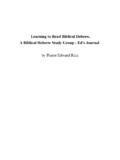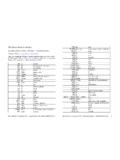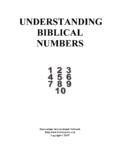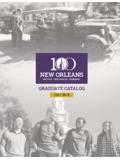Transcription of The Juicy Truth of Biblical Wine
1 THE Juicy Truth OF Biblical wine BY DAVID GROSS D Gross Page 1 Table of Contents INTRODUCTION .. 2 THE Biblical WORDS FOR 3 The hebrew Words and Meanings for wine .. 4 The Greek Words and Meanings for wine .. 5 THE MAKING AND USE OF wine IN BIBLE TIMES .. 6 The Preservation of wine .. 7 The Attitudes Towards wine .. 8 The Uses of 8 THE Biblical USE OF wine .. 9 The Negative References to wine .. 10 The Positive References to wine .. 10 12 13 D Gross Page 2 INTRODUCTION To drink, or not to drink: that is the question. As much as the Bible refers to alcohol and the dangers of drunkenness, why do people struggle with this question? Before making it through the first five books of the Old Testament, the reader is confronted with the word wine in both positive and negative references. Continuing through the rest of Scripture only validates the confusion over the issue of whether alcoholic beverages may be consumed by God s people.
2 wine is found from Genesis 9:21 with Noah s drunkenness to the end judgments on Babylon in Revelation 18:3. The focus of the issue on wine in the Bible revolves around whether every case refers to alcoholic wine or whether wine could also mean a nonalcoholic drink. Surprisingly, the English word wine , found in the King James Bible and other English translations, is used to translate at least ten different hebrew words and at least two Greek words. A study of these different words for wine in the original languages will lay the groundwork for this study on whether wine in the Bible was solely alcoholic or not. This issue also requires background and cultural study to arrive at a valid conclusion. As the morality of this world continues to wane, believers need to know what the Bible teaches about wine and fermented drinks. Studying the different hebrew and Greek words for wine , the process and use of wine in Bible times, and the Biblical view of wine will guide the believer to a clearer understanding of this muddy issue.
3 D Gross Page 3 THE Biblical WORDS FOR wine The foundation of Scripture rests in Its very words. Since God inspired the entirety of Scripture (II Tim. 3:16), God, not man, chose the words that refer to wine . The translators of the King James Version used the single word wine to translate several different hebrew and Greek words that God uses throughout the Bible. While this is not an inaccurate translation by any means, today s dominant association with wine is an alcoholic beverage. This main association did not come until the 1800 s. Charles Wesley Ewing, in his book The Bible and Its Wines, shows that English dictionaries from the early 1700 s defined wine as liquid from grapes, without attaching words like fermented to its While fermented wine was implied by some of the definitions, they were not the predominant usage at that time. Today s culture has changed the understanding of wine to be exclusively an alcoholic drink.
4 Some believe that the attempt to show the hebrew and Greek words revealing both fermented and unfermented wine is futile. Williamson, in his book wine in the Bible & the Church, says, A careful study of the hebrew and Greek terms reveal [sic] no such distinction [between fermented and unfermented wines] in Scripture. 2 While the words in the original languages of the Bible are not exclusive in the distinction between fermented and unfermented wine , examining the different words and meanings can give some general guidelines and be found profitable. 1 Charles Wesley Ewing, The Bible and Its Wines (Denver: Specialty Publishing, 1985), 2. 2 Williamson, wine in the Bible & the Church (Phillipsburg, : Presbyterian and Reformed Publishing Co., 1985), 10. D Gross Page 4 The hebrew Words and Meanings for wine A quick glance in The New Strong s Exhaustive Concordance of the Bible shows around two hundred times that the English word wine is used in the Old About ten different hebrew words make up this list.
5 The most common word is yayin. This word is the generic use of the term wine . William Patton s book, Bible Wines or The Laws of Fermentation, quotes several professors and books which demonstrate the fact that yayin can refer to either fermented wine or unfermented grape In Genesis 9:21, Noah drinks yayin and becomes inebriated, clearly indicating it can refer to an alcoholic wine . Isaiah 16:10, on the other hand, says that the treaders shall tread out no wine [yayin] in their presses. Since wine cannot become fermented while still in the grape, it only makes sense that the wine tread out of the grapes is unfermented. Yayin, as unfermented wine in particular contexts, gains credence from rabbinic writings of the past. Encyclopaedia Judaica mentions newly pressed wine , prior to fermentation as being called yayin mi-gat. 5 Already, evidence can be seen supporting the belief that not all wine referred to in the Bible is alcoholic.
6 Tirosh, another hebrew word translated as wine , sheds even more light on the distinction between two wines in the Bible. Strong defines tirosh as must or fresh grape-juice (as just squeezed out); by implication (rarely) fermented wine ; new, sweet wine . 6 Must, according to The American Heritage College Dictionary, Third Edition, means the juice expressed from fruit. Isaiah 65:8 uses this word in the phrase, As the new wine [tirosh] is 3 James Strong, The New Strong s Exhaustive Concordance of the Bible (Nashville: Thomas Nelson Publishers, 1990), 1220-1221. 4 William Patton, Bible Wines or The Laws of Fermentation (Little Rock: The Challenge Press, ), 47. 5 Cecil Roth, ed. Encyclopaedia Judaica (Jerusalem, Israel: Keter Publishing House, 1971), 16:538. 6 Strong, The New Strong s Exhaustive Concordance of the Bible, 124. D Gross Page 5 found in the cluster, giving Scriptural proof that this word identifies, at least, unfermented wine .
7 Micah 6:15 also shows that tirosh refers to what is immediately pressed from grapes. Only Hosea 4:11 allows for the possibility of tirosh being held in a negative sense. Taking this verse into consideration, Ewing still concludes, From the foregoing testimony of hebrew Scholars, and the use of tirosh in the Scriptures, it is this writer s firm conviction that tirosh is never fermented. If it becomes fermented it is no longer tirosh. 7 With or without accepting the Hosea passage as nonalcoholic, few can dispute that the dominant use of tirosh in the Old Testament refers to grape juice. While several other hebrew words translated as wine could be examined, the point that both fermented and unfermented wine exist in Scripture has already been made. Other words like shekar, enab, asis, and chemer would help to support the distinction of wines in the Bible but are not necessary to examine for the current argument. The Greek Words and Meanings for wine In addition to the hebrew of the Old Testament, the Greek of the New Testament also gives validity of two wines in the Bible.
8 Just as yayin is a general use of the word wine , including the meanings of fermented or unfermented, the Greek word oinos serves the same Revelation 17:2 says, With whom the kings of the earth have committed fornication, and the inhabitants of the earth have been made drunk with the wine [oinos] of her fornication. In this case, the Bible clearly implies that oinos is fermented since the people become drunk from it, even though the passage speaks metaphorically. Stephen Reynolds, who wrote The 7 Ewing, The Bible and Its Wines, 23. 8 Ibid., 63. D Gross Page 6 Biblical Approach to Alcohol, demonstrates how oinos must also be able to refer to unfermented wine . According to Reynolds, the Greek translation of the Old Testament, the Septuagint, uses oinos to translate yayin in Isaiah 16:10 and tirosh in Proverbs 3:10. Both of these passages refer to grape juice in the Old Even though examining the different hebrew and Greek words used for wine in the English Bible cannot give an absolute, exclusive distinction between alcoholic and nonalcoholic wine in Scripture, the fact that both do exist can be seen.
9 THE MAKING AND USE OF wine IN BIBLE TIMES After looking at the Biblical words for wine in the original languages, the reader must next consider the making and use of wine in Bible times in order to determining whether Scripture condones or forbids the use of alcoholic beverages. Upon initially studying this area, the writer of this paper became disappointed upon reading reports declaring that all wine in Bible times had to be fermented since there was no refrigeration or method of preventing it. The Zondervan Pictorial Encyclopedia of the Bible states, There apparently were no attempts made to preserve wine in an unfermented scholars are of the opinion that unfermented wine was impossible in ancient times in Palestine. 10 The Lion Encyclopedia of the Bible makes no mention of preserving the grape juice in ancient times but rather implies all wine was The discouragement of these findings faded as more detailed sources on this issue were consulted.
10 9 Stephen M. Reynolds, The Biblical Approach to Alcohol (Princeton, : Princeton University Press, 1989), 43. 10 Merrill C. Tenney, ed., The Zondervan Pictorial Encyclopedia of the Bible (Grand Rapids: Zondervan Publishing House, 1978), 5:938. 11 Pat Alexander, ed., The Lion Encyclopedia of the Bible (Tring, England: Lion Publishing, 1986), 221. D Gross Page 7 The Preservation of wine Despite what some books ignorantly say, the people living in Palestine during Bible times used several different methods to preserve wine in the unfermented state. Samuele Bacchiocchi, in his book wine in the Bible, even goes as far to say that the ancients were far more knowledgeable in the art of preserving fruits and wines than is generally presumed. 12 Without modern refrigerators or ice, how could people of the past keep their wine in the unfermented state? William Patton explains that for wine to become alcoholic there must be the right levels of sugar, yeast, temperature, and Any alteration of these conditions can potentially keep the juice from turning into an alcoholic drink.






